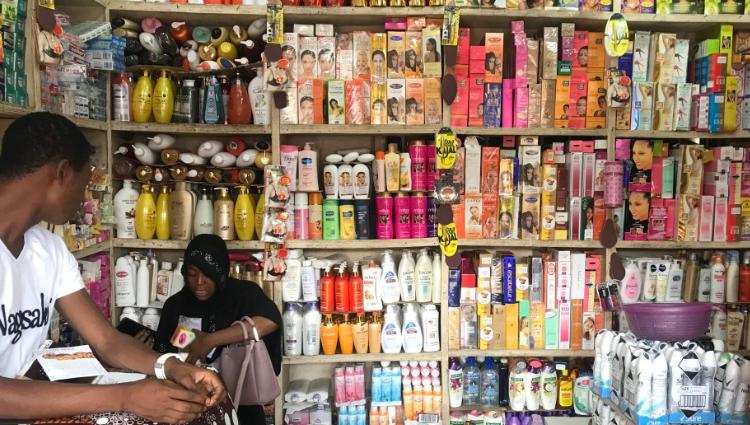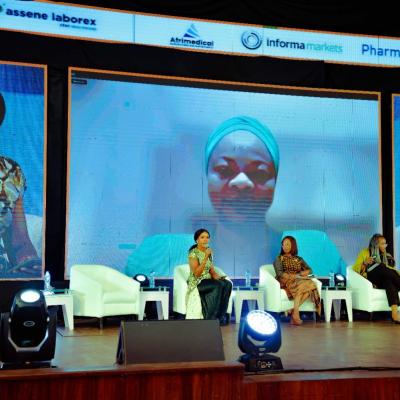In the past, the trend is mostly associated with women, but nowadays men have also joined the ‘race’. Majority of the people who spoke with PREMIUM TIMES said they believe such creams as the most effective way of getting the skin lightened.
‘Old fashioned’
However, the use of the cream is considered old fashioned for some Nigerians, as many of those who lighten their skin now rely on glutathione pills and injections to achieve their desired skin complexion.
The use of glutathione pills and injections is now the new frontier of skin bleaching. Glutathione is an antioxidant naturally found in human cells that neutralises free radicals, boosts the immune system and detoxifies the body.
This also causes skin lightening by converting melanin to a lighter colour and deactivating the enzyme tyrosinase, which helps produce the pigment. Intravenous glutathione treatments are meant to increase those natural effects, diminishing scars and blotches while lightening skin colour.
Bootleg creams: ‘Oldie but goodie’
Mrs Haruna runs a beauty place in the popular Wuse market, Abuja, where she produces bleaching creams and trains prospective cream mixers.
She said she has been in the cream business for almost two decades.
Mrs Haruna said bleaching never goes wrong with her.
“I use organic ingredients for my creams, and my customers love it.
“I am an expert in cream mixing, so I know the quantity to mix,” she said.
Rich opt for Glutathione
Mrs Haruna said a lot of rich people go for glutathione injections and pills. However, those who cannot afford such luxury buy cheaper creams, often concoctions mixed by her, she said.
Boom
Africa is fast becoming a terrain for sale of lightening products. The continent is experiencing an increasing trend in the use of skin lightening products.
At least, four out of every ten women in Africa bleach their skin, according to the World Health Organisation (WHO).
An assessment published by WHO in 2011 stated that about 77 per cent of Nigerian women uses skin-lightening products, the highest in the world.
The assessment also shows that 59 per cent of Togolese women, 35 per cent of South African women, and 25 per cent of Malian women use bleaching products regularly.
This is partly because some Africans see light skin as a sign of beauty, wealth and achievement in life.
Several African countries have banned skin lightening products, but the laws are largely unenforced. This is why skin-whitening creams and soaps continue to flood the markets in several African countries like Ghana, South Africa, Mali and Nigeria.
Perceptions
Rita Ameh, who uses skin lightening cream, said she believes ladies with light skin are more appealing than dark-skinned ladies.
“So I met a lady who sells bleaching cream during my first year at the university. She recommended a lightening soap, scrub and lightening cream to help me achieve the complexion I wanted.
“I love my new complexion more because it brings me more attention especially from men,” she said.
Uche Clement, a bag seller in Wuse market, supports the perception that light-skinned women are more attractive than dark-skinned ones.
“My wife has chocolate skin. But my sister, I must say the truth, yellow girls dey too fine.
“Any man wey know better thing go like woman wey yellow,” Mr Clement said in Pidgin.
Addiction?
Some of those who are already using skin lightening products said it is almost impossible to stop half-way.
“Once you decide to lighten your skin colour, I advise you to stick with that choice you have made.
“Stopping bleaching half way will not take your skin back to its original colour, it just makes it look really bad,” Ms Udom said.
Side effects
According to the WHO, the main adverse effect of the inorganic mercury contained in skin lightening soaps and creams is kidney damage.
The mercury in skin lightening products may also cause skin rashes, skin discolouration and scarring, as well as a reduction in the skin’s resistance to bacterial and fungal infections.
Other effects include anxiety, depression or psychosis and peripheral neuropathy.
Many users are, however, ignorant of the damaging effect of the products on their health.
“I don’t agree with you that there are any side effects from bleaching. It is simple.
“I was dark in complexion; I do not like to be dark-skinned, and I decided to tone up. For me, It is a choice I made, and I’m happy I made that decision,” Lade Olayinka, a lady, who uses skin lightening cream, said.
Experts also warned against skin bleaching, saying it may lead to skin cancer.
A dermatologist, Akin Shiyanbola, said skin lightening comes with a lot of repercussions including the possibility of skin cancer.
He said “with bleaching, myriads of things that will eventually go wrong with time could be frightening.
“Stripping the skin of its protective colour pigment connotes invitation to the enhanced damaging effect of ultraviolet rays on the skin with the possibility of skin cancers over time, accelerated skin ageing as users get older and widespread sun-related skin conditions like Dermatosis papulosa nigra.
“Other effects include loss of skin substance causing stretch marks, dyschromia (‘coke face, fanta body’), skin infections, generalised itching, hydroxyquinone odours, perturbation of hormonal system, mood changes, diabetes mellitus, kidney damage and more,” he added.
He said eating healthy, and adequate exercise gives one beautiful skin.
Mr Shiyanbola urges regulators and the media to help sensitise the public on the health risks of using skin lightening materials.
“While bleaching is being promoted overtly or covertly by the media, the regulatory agents appear to be running against the wind in terms of control.
“Those profiting from sales of various bleaching agents are smiling to the banks, and the users stake their future health for wanting a fairer skin,” he said.
Source: Premiumtimes

 There is nothing wrong with using bleaching cream. I love to be light skinned, and I changed my complexion. “I started using skin white cream at the early stage, but it was not effective on my skin, so I later added pills to it,” Sophia Udom, a 27-year-old lady, told this reporter.
There is nothing wrong with using bleaching cream. I love to be light skinned, and I changed my complexion. “I started using skin white cream at the early stage, but it was not effective on my skin, so I later added pills to it,” Sophia Udom, a 27-year-old lady, told this reporter.







